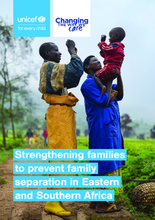Growing up in a safe and loving family is widely seen as vital for child development and wellbeing by policymakers, children, and caregivers. The family is described in the Convention on the Rights of the Child as the best environment for children to achieve their rights.
Despite these acknowledgements of the need to keep children in their families, there remains a lack of clarity on exactly how this can be achieved. In this paper, evidence primarily from Eastern and Southern Africa is pooled to outline the main components of strategies to prevent separation. It is argued that the effective prevention of separation rests on a strong care system that delivers holistic services and supports to families. The paper is aimed at policymakers and programme managers designing and delivering care reform policies, strategies, and programmes. Although the paper focuses on preventing separation, many of the findings around family strengthening also apply to foster care, child-headed households, and the reintegration of separated children.
Following on from this introduction, the paper begins with an explanation of the scope of the paper and definitions of the key concepts used. The paper then describes the case for focusing on preventing separation in further detail and explores the factors that commonly lead to family separation in Eastern and Southern Africa. The paper has three sections exploring how to prevent separation. The first outlines the principles and approaches required to prevent family separation. The second looks at the enabling environment or care system needed for the effective prevention of separation. The third explores the service and support required to prevent separation. The conclusion summarises the key findings and recommendations emerging from the paper.
This resource was developed as a part of the Eastern and Southern Africa Regional Learning Platform. Click here to see all learning products developed as part of the platform.

